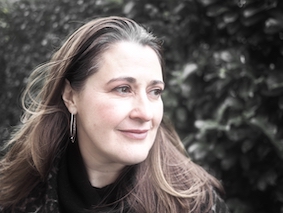Louisa Reid, a secondary English teacher, is the author of the YA verse novels Gloves Off, nominated for the Carnegie Medal, and Wrecked, which was selected for both the Read for Empathy collection and National Poetry Day. Louisa Reid’s latest YA verse novel Activist is available now published by Guppy Books. Susan Elkin spoke to her.
Your new novel Activist is about a feisty teenage girl resisting the abusive male dominance in her school. What inspired you? First there was the Everyone’s Invited website. I read hundreds of accounts of misogyny and abuse on there. It was beyond belief – a big shock. I was also influenced by the sacking of Will Knowland, the Eton Teacher who stood for “free speech” and now there’s Andrew Tate on TikTok. Patriarchal attitudes seem, one way and another to be escalating. A study from the University of Gothenburg confirms that too. It found that men under 30 are now less accepting of women’s rights.
So that’s why your protagonist, Cassie is so determined even when so many factors and factions seem to be against her? I admire the passion for activism in young people. It helps to work against the language in the press which is often negative. Take some of the patronising things which have been said to and about Greta Thunberg (especially by Donald Trump, who said she needed her bottom smacked) for example.
Do you think we need to re-educate boys and men? Yes. There’s a growing sense that “feminism has gone too far”. They see equality as a loss to them rather than something which improves life for everyone. Too many get the impression that it’s not OK for boys to be kind and gentle. Then there’s the media narrative they’re spun and expressions in the language, such as “man up”. Even the “boys” clothes they’re dressed in when they’re tiny conveys really harmful messages.
Why the verse format? I really like it – of my six novels, the last four have been in verse. I think it’s very immersive and engaging. You can pack a lot into a few words. It also means that the pages turn fast and I hope it might draw some lapsed readers back into the fold. Personally, I love verse dramas such as Tennyson’s Maud and poems by TS Eliot – poetic works which speak in different voices. It’s a fine vehicle for story telling and character.
How does your teaching fit in? I teach three days a week at the all-girls school in Altrincham that I attended myself having moved back here six years ago. I also teach creative writing one day a week at Bath Spa University although that’s just for this term. It helps, actually, because it’s important to be with young people. Feminism is a given and when, for example, I teach An Inspector Calls, we’re all united in loathing Gerald.
It sounds like a very full workload? It is, but even if I wanted to there’s no question of giving up teaching at the moment. I have a daughter in the sixth form and another at university. We need the income. You don’t, sadly, make much from authorship. And as for fitting everything in – I do a lot of thinking and working things out in my head and then it’s just a matter of sitting at the computer and getting the words down. You have to have something on the page before you can start editing.
Do the young people you see all the time react much to your books? I don’t go on about them much at school but occasionally a student will comment. My younger daughter who’s in the lower sixth tells me that some of her fellow students are reading my books and liking them.
Have you always wanted to be a writer? Yes. When I was a teenager I thought “novelist” sounded very glamorous. So I tinkered with writing then. I started in earnest when I was on maternity leave with my first child. I was in Switzerland and I needed a project alongside the baby. Then I got an agent. It took a while to get off the ground, though.
What’s next? I’m writing an adult verse novel about a woman responding to sexualisation and learning that sex does not validate you. And it’s underpinned by a revenge plot.
So it all comes back to Hamlet in the end? Definitely!



